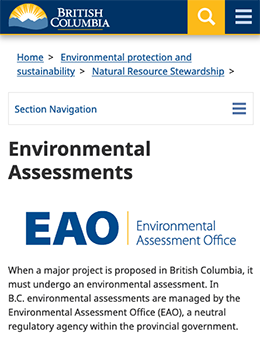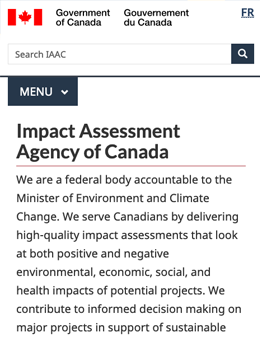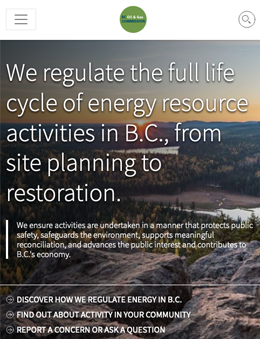Departments
Territorial Management
Regulatory Agencies
British Columbia Environmental Assessment Office
The BCEAO is a neutral agency that manages the review of proposed major projects in British Columbia, as required by the Environmental Assessment Act.
The environmental assessment process provides for the thorough, timely and integrated assessment of the potential environmental, economic, social, heritage and health effects that may occur during the lifecycle of these projects, and provides for meaningful participation by First Nations, proponents, the public, local governments, and federal and provincial agencies.
The Fairness and Service Code for EAO has been developed to give project proponents, First Nations and the public an understanding of what can be expected during a provincial environmental assessment.
Canadian Environmental Assessment Agency
The CEAA is a federal body accountable to the Minister of the Environment. The Agency provides high-quality environmental assessments (EA) that contribute to informed decision making, in support of sustainable development. The Agency is the responsible authority for most federal EAs. The Agency:
- Manages the EA process for projects that may require an EA and do not fall under the mandate of the NEB;
- Provides opportunities and funding to support public participation in EAs;
- Serves as the coordinator for consultation with Aboriginal groups during the EA for projects it manages;
- Works to ensure that mitigation measures are applied and are working as intended;
- Promotes uniformity and coordination of EA practices across Canada through research, guidance and ongoing discussion with stakeholders and partners; and
- Works with a range of international jurisdictions and organizations to exchange best practices in EA.
National Energy Board
BC Oil and Gas Commission
The Commission is an independent, single-window regulatory agency with responsibilities for overseeing oil and gas operations in British Columbia, including exploration, development, pipeline transportation and reclamation.
The Commission was created as a Crown Corporation through the enactment of the Oil and Gas Commission Act. In October 2010, the Commission transitioned to the Oil and Gas Activities Act. This regulatory model is designed to provide a streamlined one-stop regulatory agency. Regulatory responsibility is delegated to the Commission through the Oil and Gas Activities Act and includes specified enactments under the Forest Act, Heritage Conservation Act, Land Act, Environmental Management Act, and Water Act. The cost of operating the Commission is funded through the application of industrial fees and levies on a cost recovery basis.
The Commission’s core roles include reviewing and assessing applications for industry activity, consulting with First Nations, ensuring industry complies with provincial legislation and cooperating with partner agencies. The public interest is protected through the objectives of ensuring public safety, protecting the environment, conserving petroleum resources and ensuring equitable participation in production.
Regulatory responsibility of the Commission extends from the exploration and development phases, through to facilities operation and ultimately decommissioning. It is charged with balancing a broad range of environmental, economic and social considerations.




